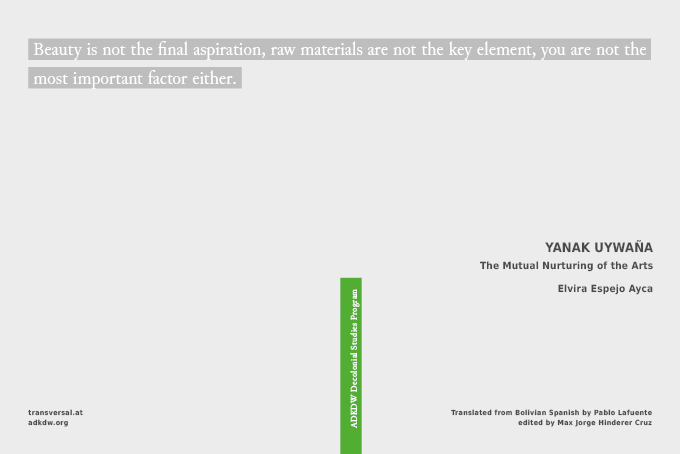Translated from Bolivian Spanish by Pablo Lafuente
edited by Max Jorge Hinderer Cruz
Elvira Espejo Ayca is an artist, musician, weaver and storyteller in the oral tradition of her place of origin, the Allyu Qaqachaka in Oruro, Bolivia. In her essay YANAK UYWAÑA. The Mutual Nurturing of the Arts, she speaks of reason and aesthetics as instruments of Western philosophical domination, which functions as a form of legitimization of colonial extractivism: Extractivism of raw materials, cultural goods and forms of knowledge alike. Art galleries – Espejo writes – are part of how a hierarchized epistemic geopolitics works. In the present essay, Elvira Espejo Ayca discusses paradigm shifts in how we understand art, resulting from the linguistic terminology of the Aymara language and from life in the indigenous communities themselves, through the creation of cultural goods and information resources that contribute to the understanding of mutual education as a new vision of life and also as a means of anti-colonial resistance.
Elvira Espejo Ayca is the director of the National Museum of Ethnography and Folklore (MUSEF) in La Paz. The present translation of YANAK UYWAÑA. La crianza mutua de las artes, published by PCP – Programa Cultura Política, La Paz, was produced as part of the exhibition Potosí Principle – Archive, a project by Alice Creischer and Andreas Siekmann, as part of the Decolonial Studies Program of the Academy of the Arts of the World/Cologne (Akademie der Künste der Welt/Köln).
This publication is funded by the Akademie der Künste der Welt/Köln (Academy of the Arts of the World/Cologne) as part of the Decolonial Studies Program (2022-2023)

